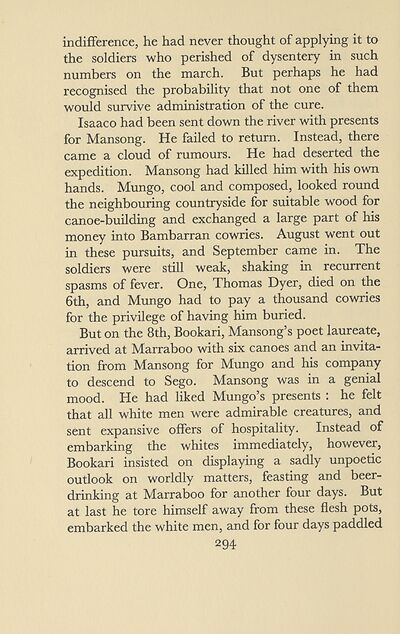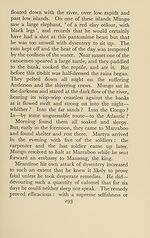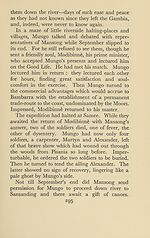Niger
(300)
Download files
Complete book:
Individual page:
Thumbnail gallery: Grid view | List view

indifference, he had never thought of applying it to
the soldiers who perished of dysentery in such
numbers on the march. But perhaps he had
recognised the probability that not one of them
would survive administration of the cure.
Isaaco had been sent down the river with presents
for Mansong. He failed to return. Instead, there
came a cloud of rumours. He had deserted the
expedition. Mansong had killed him with his own
hands. Mungo, cool and composed, looked round
the neighbouring countryside for suitable wood for
canoe-building and exchanged a large part of his
money into Bambarran cowries. August went out
in these pursuits, and September came in. The
soldiers were still weak, shaking in recurrent
spasms of fever. One, Thomas Dyer, died on the
6th, and Mungo had to pay a thousand cowries
for the privilege of having him buried.
But on the 8th, Bookari, Mansong’s poet laureate,
arrived at Marraboo with six canoes and an invita¬
tion from Mansong for Mungo and his company
to descend to Sego. Mansong was in a genial
mood. He had liked Mungo’s presents : he felt
that all white men were admirable creatures, and
sent expansive offers of hospitality. Instead of
embarking the whites immediately, however,
Bookari insisted on displaying a sadly unpoetic
outlook on worldly matters, feasting and beer¬
drinking at Marraboo for another four days. But
at last he tore himself away from these flesh pots,
embarked the white men, and for four days paddled
294
the soldiers who perished of dysentery in such
numbers on the march. But perhaps he had
recognised the probability that not one of them
would survive administration of the cure.
Isaaco had been sent down the river with presents
for Mansong. He failed to return. Instead, there
came a cloud of rumours. He had deserted the
expedition. Mansong had killed him with his own
hands. Mungo, cool and composed, looked round
the neighbouring countryside for suitable wood for
canoe-building and exchanged a large part of his
money into Bambarran cowries. August went out
in these pursuits, and September came in. The
soldiers were still weak, shaking in recurrent
spasms of fever. One, Thomas Dyer, died on the
6th, and Mungo had to pay a thousand cowries
for the privilege of having him buried.
But on the 8th, Bookari, Mansong’s poet laureate,
arrived at Marraboo with six canoes and an invita¬
tion from Mansong for Mungo and his company
to descend to Sego. Mansong was in a genial
mood. He had liked Mungo’s presents : he felt
that all white men were admirable creatures, and
sent expansive offers of hospitality. Instead of
embarking the whites immediately, however,
Bookari insisted on displaying a sadly unpoetic
outlook on worldly matters, feasting and beer¬
drinking at Marraboo for another four days. But
at last he tore himself away from these flesh pots,
embarked the white men, and for four days paddled
294
Set display mode to:
![]() Universal Viewer |
Universal Viewer | ![]() Mirador |
Large image | Transcription
Mirador |
Large image | Transcription
Images and transcriptions on this page, including medium image downloads, may be used under the Creative Commons Attribution 4.0 International Licence unless otherwise stated. ![]()
| The books of Lewis Grassic Gibbon > Niger > (300) |
|---|
| Permanent URL | https://digital.nls.uk/205178170 |
|---|
| Description | Sixteen books written by Lewis Grassic Gibbon (1901-1935), regarded as the most important Scottish prose writer of the early 20th century. All were published in the last seven years of his life, mostly under his real name, James Leslie Mitchell. They include two works of science fiction, non-fiction works on exploration, short stories set in Egypt, a novel about Spartacus, and the classic 'Scots Quair' trilogy which includes 'Sunset Song'. Mitchell's first book 'Hanno, or the future of exploration' (1928) is rare and has never been republished. |
|---|---|
| Additional NLS resources: |
|

